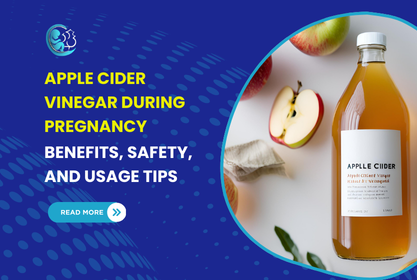The time of pregnancy is very important, wherein most women have a number of doubts and questions about the kind of food and drink that is really safe to take. One of the burning questions asked by mothers-to-be is about Apple Cider Vinegar- How safe is it during pregnancy? Is it beneficial? Or harmful? This blog does not just answer queries of pregnant women regarding apple cider vinegar but also delves into how to safely include the product in their everyday use.
These are the times when women’s minds are filled with many questions and worries regarding what is safe when it comes to food and drink. One such question that constantly comes up would probably be the issue of Apple Cider Vinegar (ACV) when linked to pregnancy and everything regarding safety, benefits, and possible hazards. This long blog goes along with the topic concerning apple cider vinegar and pregnancy, addressing all those questions and including how an individual can safely add it to their regimen.

What Is Apple Cider Vinegar (ACV)?
This is something one would refer to as the natural fluid made by fermenting apple juice with yeast and bacteria: apple cider vinegar. It is a widely known entity, pertaining to its benefits to the human body, and has been utilized in natural medicine due to its efficaciousness in aiding digestion, improving the body’s immune response, and helping regulate blood sugar levels. However, what is important is how this impacts an individual physiologically during pregnancy.
Is Apple Cider Vinegar Safe During Pregnancy?
The different types of apple cider vinegar come with different safety levels:
Unsafe for mothers and the unborn because of certain microbes like E. coli or Listeria, unpasteurized apple cider vinegar is unsafe to consume for mothers since it can infect the unborn.
Pasteurized apple cider vinegar- It is this vinegar that is safe during pregnancy. Pasteurization kills pathogens that affect humans, thus making sure every product passable for whatever human consumes is safe.
Benefits of Apple Cider Vinegar During Pregnancy
1. Strong acids present in apple cider vinegar help neutralize acid in the stomach and relieve nausea and vomiting at the initial stages of pregnancy.
2. Eases Indigestion: Most women during pregnancy either feel heartburn or suffer from indigestion, and ACV works wonders by balancing the PH levels in the stomach and relieving them from such intake discomforts.
3. Regulation of Blood Sugar: Blood sugar levels vary widely during the pregnancy. However, it is most useful for educating people about blood sugar levels during the period of increased risk for gestational diabetes.
4. Boosting Immunity: The antimicrobial effects of ACV treat any infections contracted through pregnancy.
5. Relieves Leg Cramps: ACV which is very rich in potassium is helpful in relieving leg cramps often experienced during pregnancy.
How to Use Apple Cider Vinegar During Pregnancy
1. Dilute It Before Drinking
Do not consume ACV in neat form as in high acidic it may damage without much effects tooth enamel and stomach lining of a person. Generally, mix 1-2 teaspoons of ACV’s liquid with a glass of water.
2. Pour It Into Salads
Use ACV in your salad dressing for the flavorful safety-intern application of this ingredient in your diet.
3. Use in Recipes
ACV may be used during cooking or baking because heating diminishes the chances brought by the consumption of raw ACV to microbial contamination.
4. External Application
Dilute ACV with water, and apply to an affected site for conditions on the skin like acne. First, complete the patch test.
Potential Risks of Apple Cider Vinegar During Pregnancy
While ACV has its benefits, there are a few precautions to keep in mind:
- ACV is good in many ways, but the possible cons are:
Overconsumption: Drinking too much ACV can cause low levels of potassium in the body and cause clinical weakness in the bones. The recommended dosage should be followed.
- Tooth Enamel Damage: Prolonged use may be eroded due to acidity. Rinse your mouth every time after an ACV.
- Gastrointestinal upset: There are also women who have this upset stomach since they are not used to eating sour foods.
Best Practices for Choosing Apple Cider Vinegar
For Example, Pasteurized: It is best to keep away from consuming unpasteurized ACV; discover what it is with respect to harmful bacteria.
Go Organic: Organic ACV is free from the dreaded pesticides and chemicals.
Shop from Well-known Brands: Stick to the big brands; this solves everything for both quality and safety.
You Should Look for Pasteurized Options: Avoid Unpasteurized Apple Cider Vinegar as it may expose you to harmful bacteria. Go Organic since Organic Apple Cider Vinegar is free from any pesticides and harmful chemicals. Shop from trusted brands, as well-known brands take care of quality and safety.
FAQs About Apple Cider Vinegar During Pregnancy
FAQs About Apple Cider Vinegar During Pregnancy
1. Can I drink apple cider vinegar daily during pregnancy?
Yes, but in moderation. Limit your intake to 1-2 teaspoons per day, diluted with water.
2. Can ACV help with urinary tract infections (UTIs) during pregnancy?
ACV’s antibacterial properties may help reduce the risk of UTIs, but consult your doctor for severe cases.
3. Are there alternatives to ACV during pregnancy?
Yes, lemon water, ginger tea, or probiotics can also offer similar digestive and immune-boosting benefits.
Success Stories: Real Moms and ACV
There are a lot of mothers who find relief from the discomforts of pregnancy through the use of apple cider vinegar. This is Megha’s Story: “I went through terrible morning sickness for the first 3 months of my pregnancy, and drinking diluted ACV in warm water worked wonders for me; it was my remedy every morning!” Sophia’s Experience: “I had heartburn quite a bit, and then discovered that ACV could relieve it if I just took it with water before eating.” Tip from Anjali: “ACV was my secret weapon for skin breakouts during pregnancy. Diluting it and using it as a toner cleared my skin.
Conclusion: Should You Use Apple Cider Vinegar During Pregnancy?
In many cases, apple cider vinegar acts as a good supplement to a pregnancy regimen, but if not more than recommended it should be taken with caution and in moderation. Always use pasteurized ACV and when trying something new, it is wise to consult your doctor.
Thus, while benefiting from this useful ingredient, you could comfortably put your health and the baby’s growth at risk by understanding its advantages and disadvantages.
Also Read: Pregnancy Boudoir: Embrace the Beauty of Motherhood Elegantly



